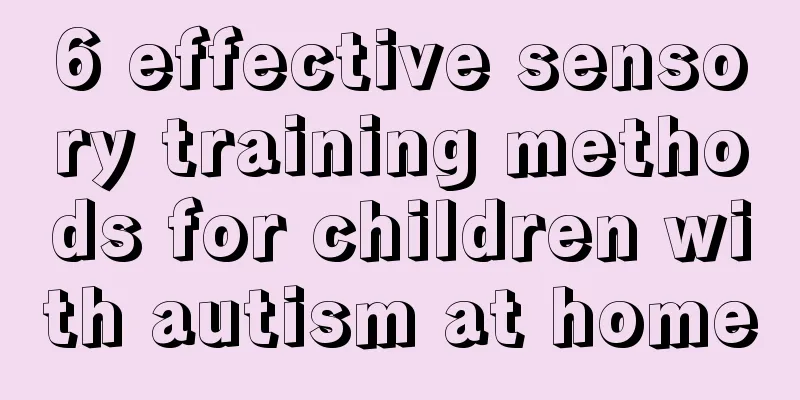6 effective sensory training methods for children with autism at home

|
Autism may be familiar to everyone now, and the number of children suffering from autism is increasing. There are many causes of autism. Generally, the most obvious symptom of autistic children is refusal to communicate, lack of interest in toys or games, and poor language expression. Moreover, most children with autism suffer from sensory integration disorder or ADHD, so the method of sensory integration training for autism is also very important. 1. Visual training Children with autism have short attention spans, especially difficulty making eye contact and poor tracking ability. We carry out the following in training: (1) Look at fixed objects, such as toys, pictures, real objects, etc. (2) Look at moving objects, such as a rolling ball, flying butterflies, moving lights, etc. (3) Look at complex patterns, find designated objects in the pictures, find similarities and differences in the pictures, etc. (4) Make eye contact, hold the child’s head with both hands, call his name affectionately, look at him lovingly, take out something he likes to show him, then immediately put the item away and follow the child’s gaze. 2. Auditory training (1) Listen to your favorite songs and sounds. (2) Listen to simple sounds. (3) Listen to simple instructions. (4) Listen and find the source of moving sound. (5) Imitate sounds, such as sounds from nature, calls of small animals, etc. 3. Taste training Use taste bottles to allow students to taste a variety of flavors. (1) Identify simple flavors, such as sour, sweet, bitter, spicy, and salty condiments. (2) Distinguish two or more flavors. Enjoy rice crust, fish fillets, stir-fried dishes, mixed vegetables, etc. 4. Olfactory training Children with autism often have a slow response to smell. During training, we use olfactory bottles to practice, such as sniffing sesame oil, soy sauce, vinegar and wine. When cooking fish or meat, remind them to smell what the smell is like, etc. 5. Tactile training By using the contact between the body and hands and external objects, children can feel the existence and changes of objective things. (1) Touch with hands to distinguish the size, quantity, shape, softness, hardness, dryness, wetness, weight, roughness and smoothness of objects. (2) Physical contact: Through grabbing, patting, hitting, pinching, squeezing, pressing, brushing, tying and massaging the human body, autistic children can experience pain, itching and comfort through physical contact. 6. Oral activity training Oral activity training is part of language training, which enables autistic children without language to learn pronunciation and speak. Language training exercises are obviously helpful for children's oral training and are very popular among parents, teachers and children. Language training exercises It is divided into five parts: (1) Oral movements include pursing the lips, grinning, puffing out cheeks and smacking lips. (2) Tongue movements include extending and retracting the tongue, licking the lips, licking the corners of the mouth, flicking the tongue, licking around the lips, and touching the cheeks. (3) There are four stages of mandibular movement: opening and closing the mouth, moving left and right, moving forward and backward, and clenching the teeth. (4) Pronunciation nursery rhymes: A nursery rhyme is written based on the position of the tongue during pronunciation. The nursery rhyme involves the tip of the tongue sounds, the front of the tongue sounds, the root of the tongue sounds and the rolled tongue sounds. (5) There are six steps in oral massage: rubbing the mouth circle, pinching the lower face, wiping the chin, tapping the cheekbones, kneading the cheeks and patting the face. During oral training, in addition to language training exercises, we often have the children blow bubbles, blow candles, blow hair, blow streamers, drink water with a straw, lick the syrup on the corner of the mouth with their tongues, etc. |
<<: At what age can a baby drink pure milk?
>>: Why does my baby rub his feet?
Recommend
Why does my baby sweat at night?
Some children always sweat when they sleep at nig...
What should I do if my child is beaten by the teacher?
Children are basically the apple of their parents...
What causes calf muscle pain in children?
Many children have calf muscle pain, which seriou...
What is the cause of hangnails on children's hands?
Parents will be very worried when they find hangn...
Height standard and complementary food addition for five-month-old babies
Parents are very concerned about their children&#...
What should I do if my baby has seasonal eczema?
Babies are the center of a family, and their heal...
Can babies get rhinitis?
Nowadays, the number of people suffering from rhi...
What to do if your child has depression tendencies
We all know that in the process of children's...
The reason why children always have phlegm in their throats
Children generally have poor resistance and are o...
Baby expectorant diet
Many newborns suffer from coughing, and most of t...
Traditional Chinese medicine for treating infant eczema
I believe that everyone is very familiar with the...
What to do if your baby has mouth ulcers
Mouth ulcers are a very common symptom, which are...
What to do if your child has swollen tonsils
If a child has swollen tonsils, parents should of...
What to do with neonatal eczema
Many newborns have eczema, so what is neonatal ec...
Two and a half year old baby education
Many mothers are more concerned about whether the...









